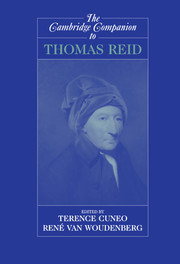Book contents
- Frontmatter
- Introduction
- 1 Reid in Context
- 2 Thomas Reid and the Culture of Science
- 3 Reid on Common Sense
- 4 Reid’s Theory of Perception
- 5 Reid’s Reply to the Skeptic
- 6 Nativism and the Nature of Thought in Reid’s Account of Our Knowledge of the External World
- 7 Reid and the Social Operations of Mind
- 8 Reid on Memory and the Identity of Persons
- 9 Thomas Reid’s Theory of Freedom and Responsibility
- 10 Reid’s Moral Philosophy
- 11 Reid’s Philosophy of Art
- 12 Reid’s Philosophy of Religion
- 13 Reid’s Influence in Britain, Germany, France, and America
- Bibliography
- Index
Introduction
Published online by Cambridge University Press: 28 May 2006
- Frontmatter
- Introduction
- 1 Reid in Context
- 2 Thomas Reid and the Culture of Science
- 3 Reid on Common Sense
- 4 Reid’s Theory of Perception
- 5 Reid’s Reply to the Skeptic
- 6 Nativism and the Nature of Thought in Reid’s Account of Our Knowledge of the External World
- 7 Reid and the Social Operations of Mind
- 8 Reid on Memory and the Identity of Persons
- 9 Thomas Reid’s Theory of Freedom and Responsibility
- 10 Reid’s Moral Philosophy
- 11 Reid’s Philosophy of Art
- 12 Reid’s Philosophy of Religion
- 13 Reid’s Influence in Britain, Germany, France, and America
- Bibliography
- Index
Summary
History can be a fickle judge. After enjoying enormous popularity in the United States, Great Britain, and France for almost one hundred years after his death, Thomas Reid (1710-96) disappeared from the philosophical canon. Reid's disappearance did not have the consequence that his thought failed to influence subsequent philosophers: One can discern, for example, distinctly Reidian themes and methodology at work in Moorean “ordinary language” philosophy. But it did mean that Reid made no appearance in the story that philosophers in the last century have told - and continue to tell - about the development of early modern philosophy. The basic shape of this story is familiar enough and goes something like this:I
Early modern philosophy was animated by two central worries: First, given its dismal history of disagreement and present state of faction, how could philosophy progress in the way and to the degree that the natural sciences had? And, second, how could traditional objects of philosophical inquiry such as free will, the soul, and God be fit into the world as described by the new science? The urgency of both these issues occasioned a crisis in modern philosophy. In their own way, and with varying degrees of success, rationalists such as Descartes and empiricists such as Hume grappled with these issues. But only in the figure of Immanuel Kant do we encounter a sustained and ingenious attempt to blend the rationalist and empiricist ways of addressing these problems.
- Type
- Chapter
- Information
- The Cambridge Companion to Thomas Reid , pp. 1 - 30Publisher: Cambridge University PressPrint publication year: 2004



